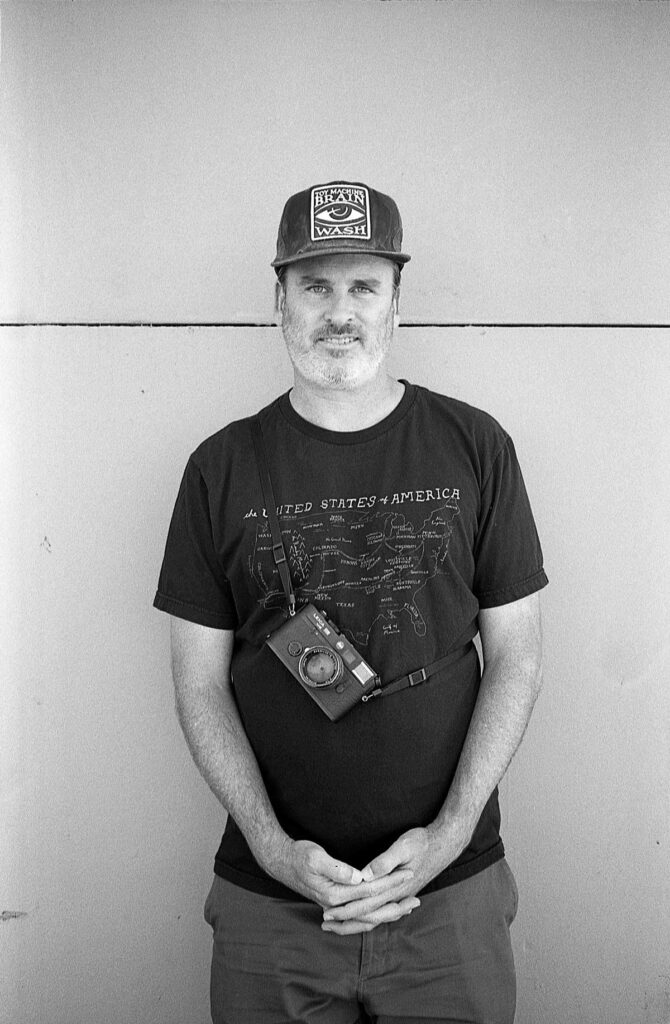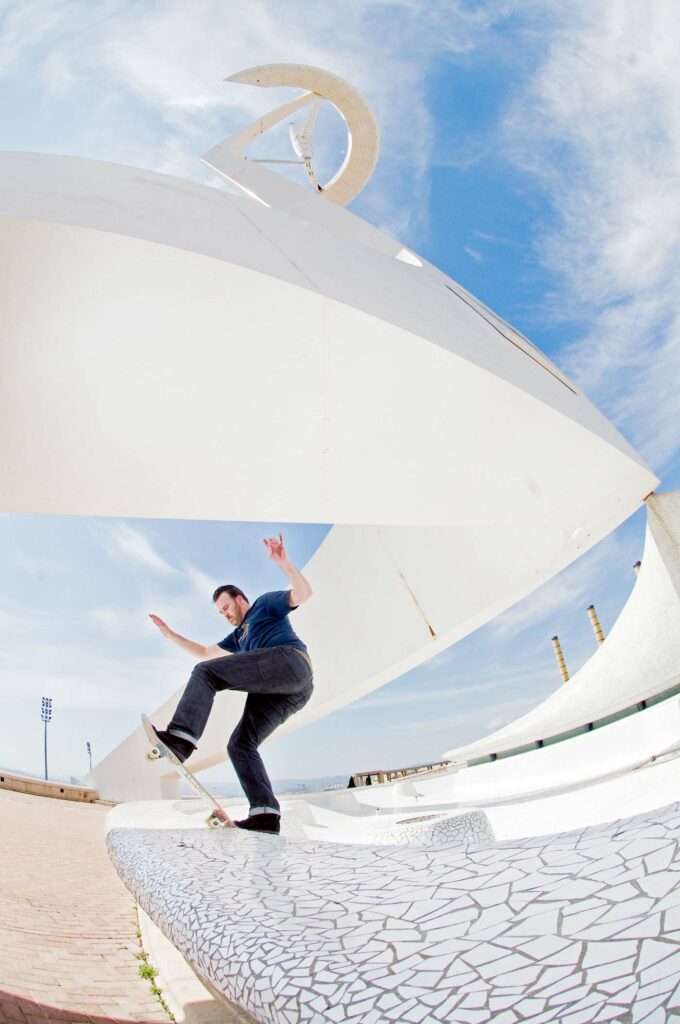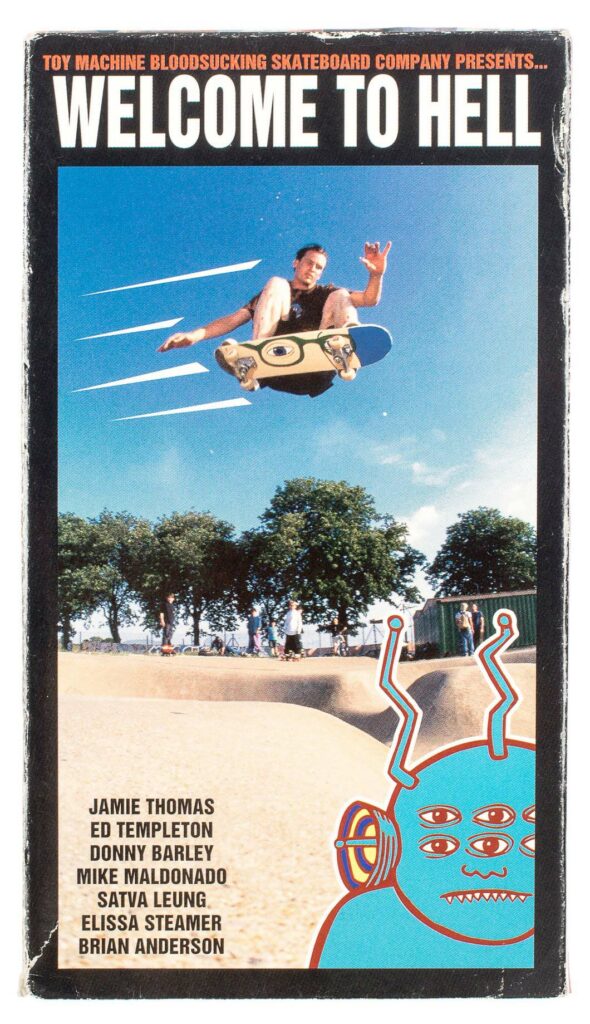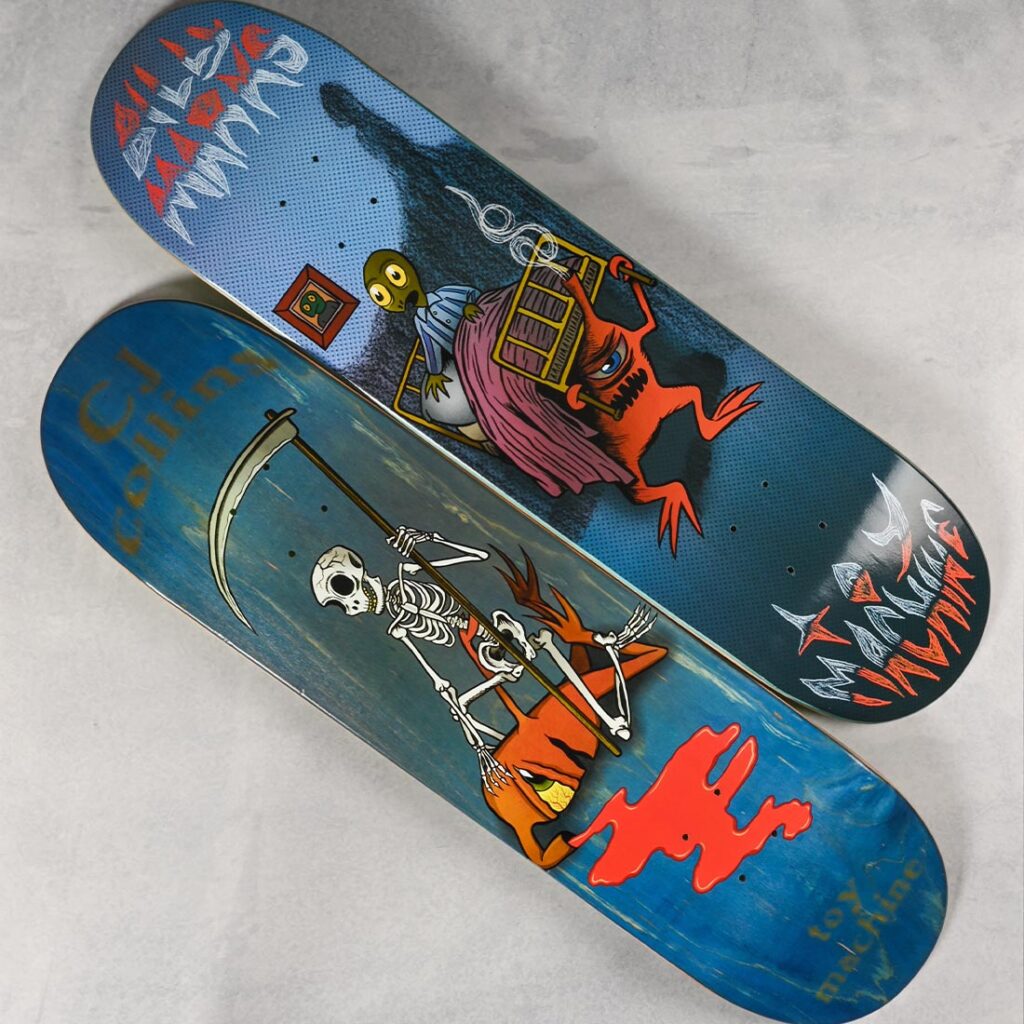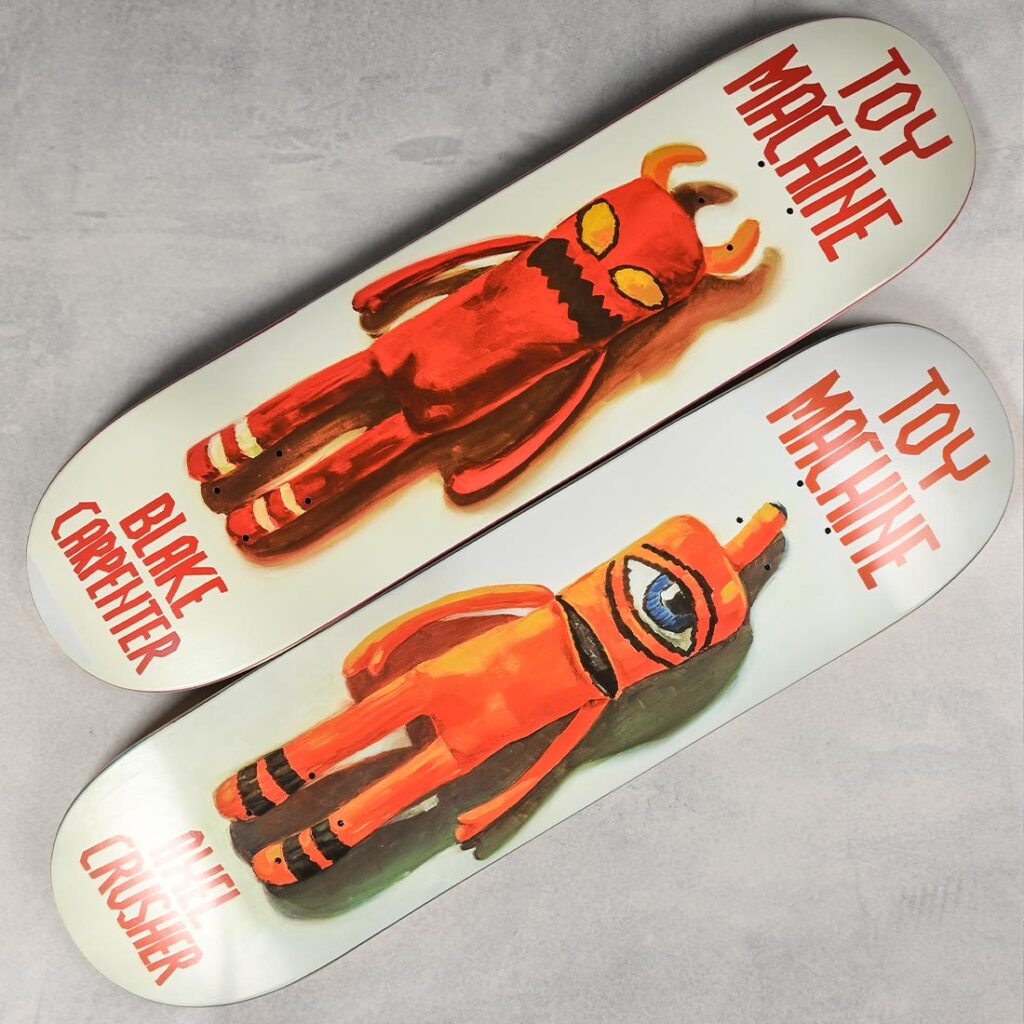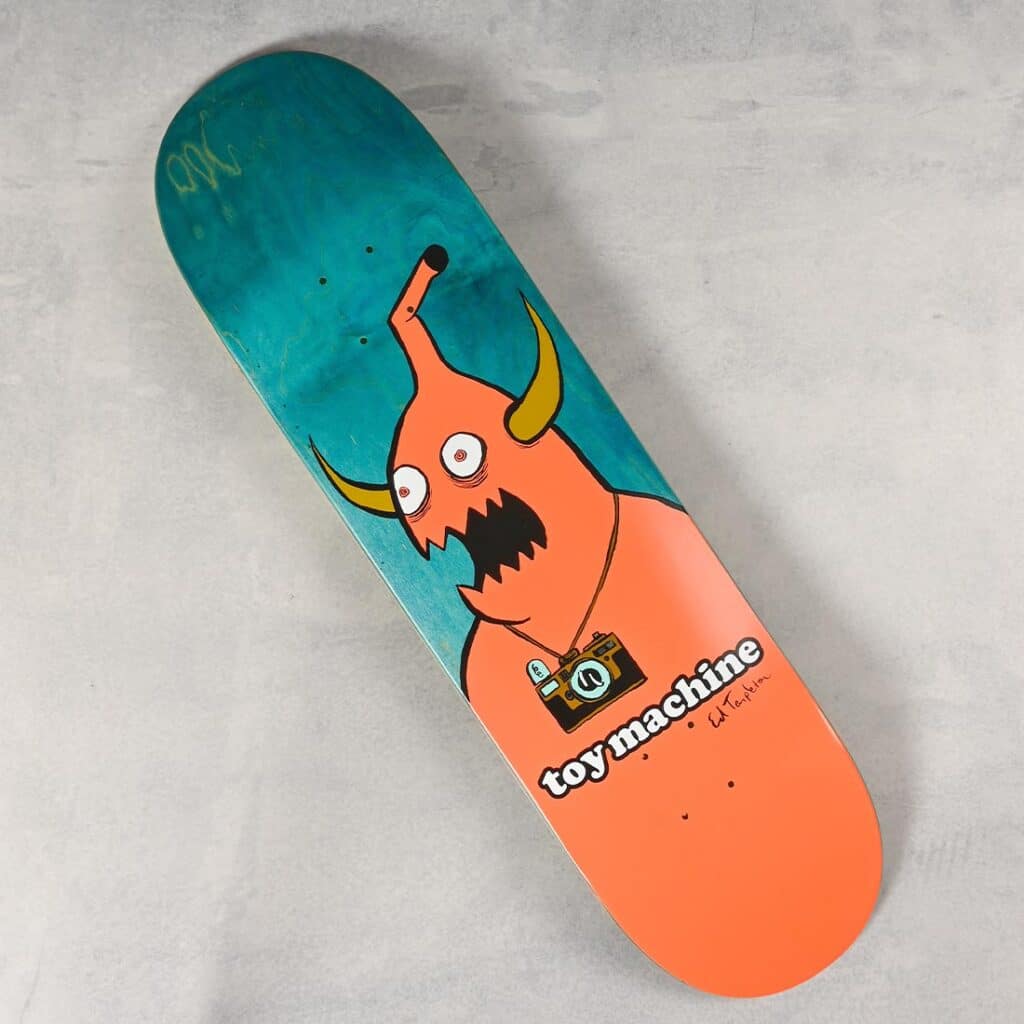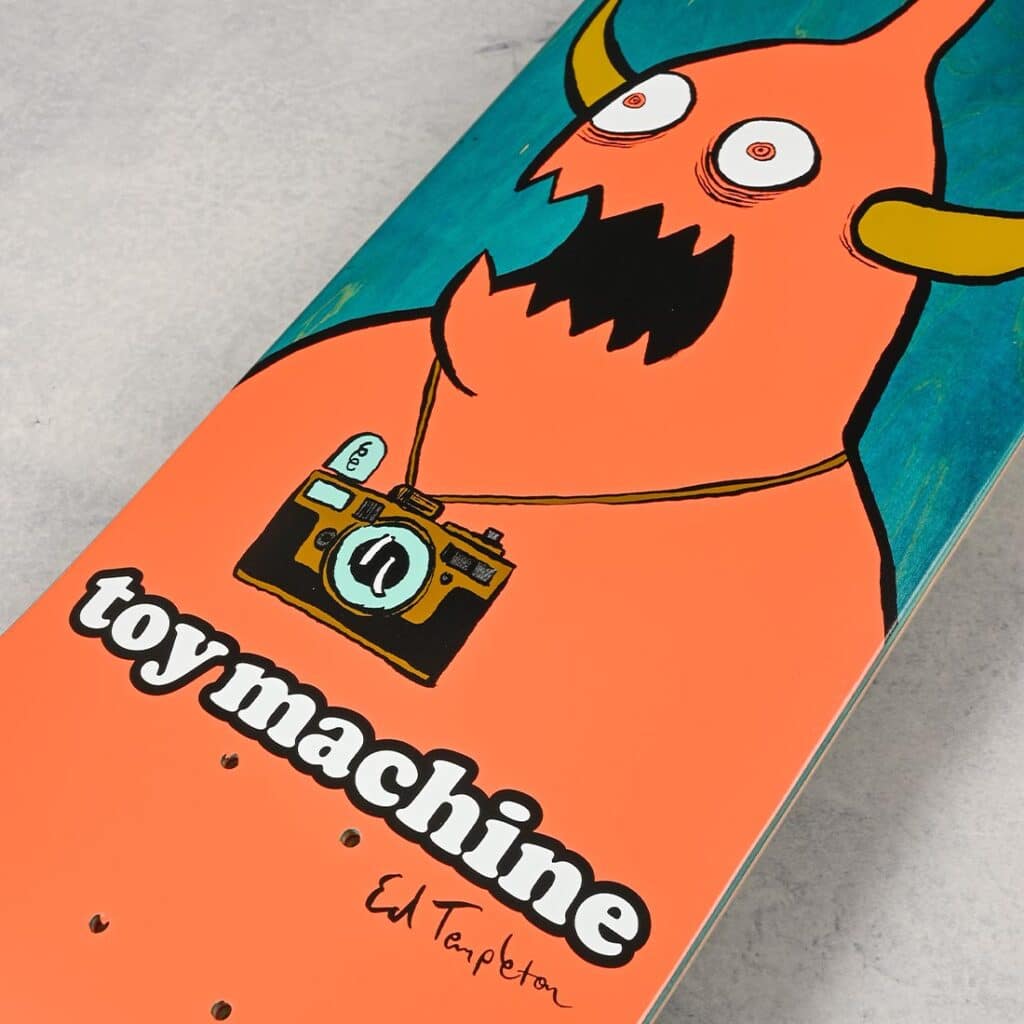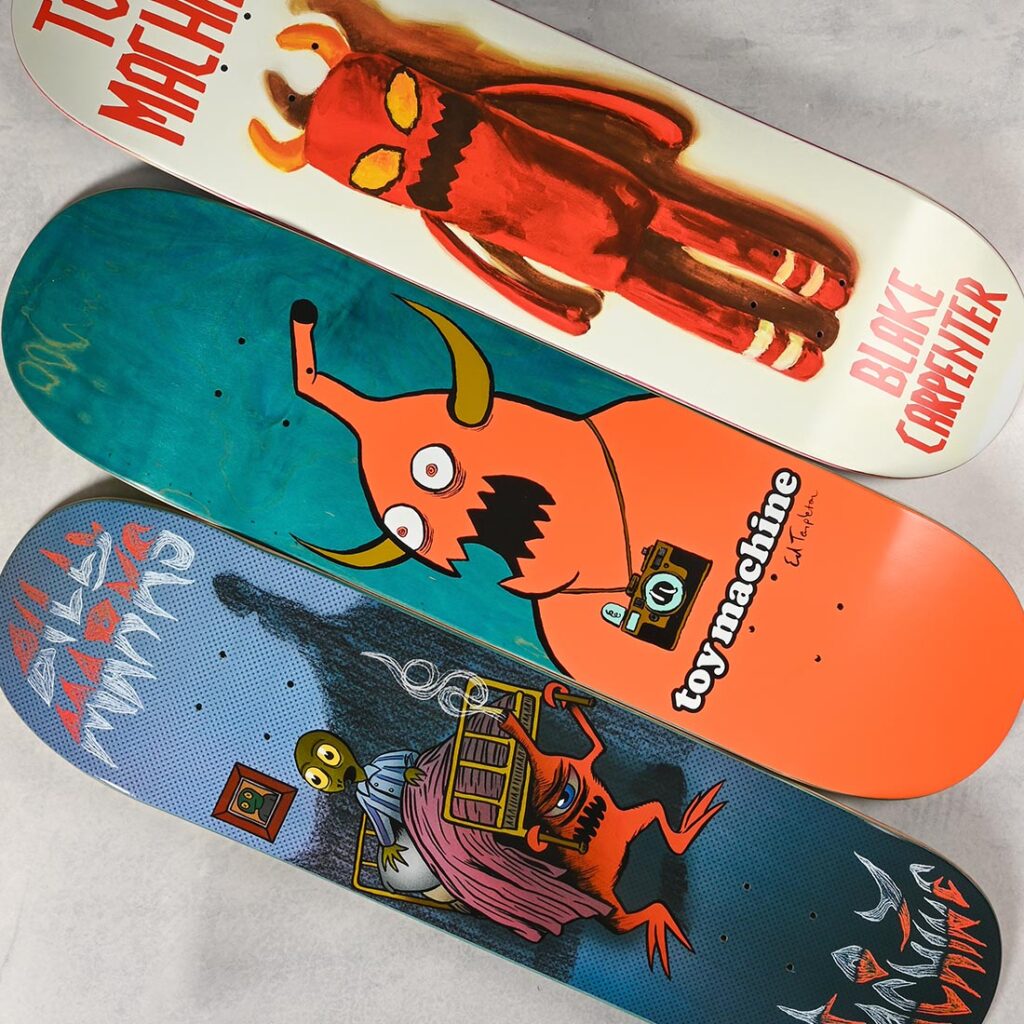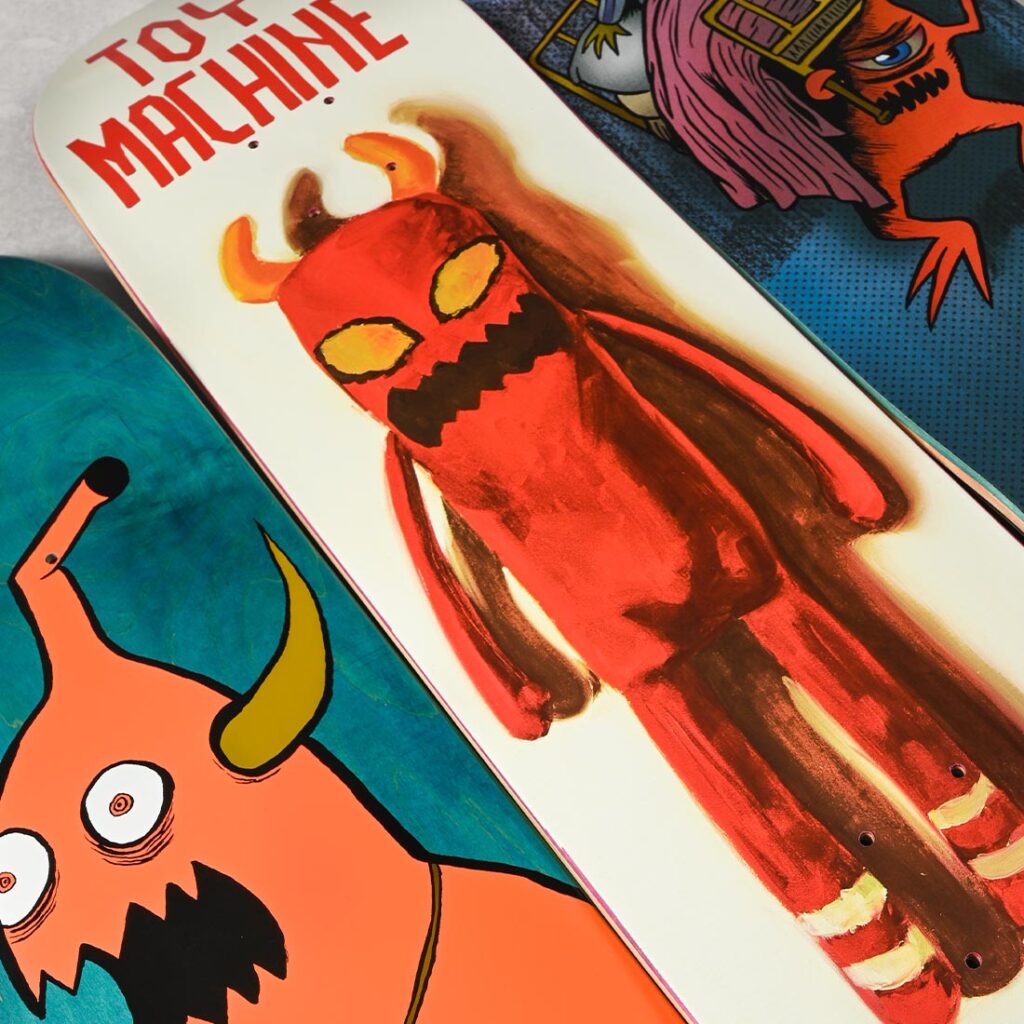Who is Ed Templeton?
Skateboarding has a lot to thank Ed Templeton for. Whether it is heavily elevating the level of street skating in the late ’80s/early ’90s, creating one of the most iconic skate companies ever or being one of the first skaters to call out homophobia and sexism within the scene, Ed has always had his finger on the pulse.
Ed Templeton started his skateboarding career at New Deal Skateboards and spent a lot of time with good friend Jason Lee. The two of them were on a mission to transform street skating by incorporating freestyle skating with the streets, resulting in NBD’s such as impossibles being thrown down stair sets and Ed getting the first-ever handrail 50-50 seen in publication.
After leaving New Deal, Ed began a small business alongside another good friend of his, Mike Vallely, creating the board company “TV” which quickly fell through due to investor difficulties. This then led to the creation of the legendary Toy Machine Skateboards which gifted the world of skateboarding multiple mind-melting videos such as, Welcome to Hell and Jump Off a Building.
From there on out Toy Machine has become a real powerhouse company, regardless of ups and downs in the past. Due to the authentic love for skateboarding Toy Machine and Ed Templeton exude, both are held incredibly dearly within the skateboard scene and will do for many years to come.
Alongside these accolades, Ed released a plethora of amazing video parts, all including the signature Templeton style, trick choice and fashion sense. Ed has really left a mark on skateboarding that will be hard to forget. With a passion for art and photography on top of all this, Ed is a creative entity, and his vision has gifted so many skaters a new insight into what skateboarding is or can be.
We are super excited to share this interview with everyone and cannot stress enough how appreciative we are to be able to ask the man himself a couple of questions. Thanks Ed.
Personal life and photography
Hi Ed, thank you very much for taking time out to do this. Before we get into this, I would just like to say that everyone here at Supereight is a massive fan of both yourself and Toy Machine Skateboards. I have tried to not completely bombard you with questions here, but there are so many super interesting topics to discuss it’s hard to leave anything out. I thought it’d be a good idea to ask a few questions about your past and passions before we get into Toy Machine. We all hope you are well and you keep on crushing it for many years to come!
Where do you prefer to shoot photos? London or Huntington Pier?
I always prefer shooting in London over Huntington Beach probably because I live here in HB and see it all the time, whereas London is much more exciting.
Favourite Fugazi song?
That’s a tough one I don’t think Fugazi’s entire output can be distilled into one single song but if I had an answer right now I would say “Give me the Cure” – it’s fitting for the pandemic times we live in.
Artistically, what are your favourite brands out at the moment?
I don’t know if I ever think of any brands as my favorite. Are you talking about skateboard brands or is this just like a Coke versus Pepsi question? I don’t drink either of those. I think you mean skate brands. I always laugh at Grimple Stix, Frank Gerwer is great.
Do you approach your art outside of skating with the same method as board graphics or ads? I know you don’t mention the fact you are a pro-skater at art galleries, so I wondered if you go into this artwork with a different mindset.
Yeah, there’s definitely a different mindset doing painting versus doing a skateboard ad. The audience is slightly different when I sit down to do an ad, I think of the target audience being 15-year-old skater boys and I wonder what would make them laugh or get them stoked. Or I think of my team and what would make them laugh. But also, I see little bits of advertising all day long on TV commercials and print ads and laugh at the ridiculousness of the language and then adopt that language into the verbiage I use in Toy Machine ads. Have you ever listened to the bullshit at the end of a drug ad? For all my other artwork the audience is much wider, essentially the entire world, so in that case, the target audience is really myself. I try to make things that tell the story I’m trying to tell photographically or in a painting from my particular perspective.
I read that your ‘Teenage Smokers’ photo series won an art competition in Italy without you even entering it. Is it true that it was submitted by a friend of yours?
Yes. It was a contest called “Search for Art.” A collector had bought the Teenage Smokers series from a show I had done a year earlier. This person lived in Italy where the contest was being held. They entered the work into the contest and told the gallerist Aaron Rose who sold it to them, but he forgot to tell me about it. I get a call one day from an Italian guy saying I’m a finalist in a contest and that I need to come to Italy and be there in person in case I win. So, I flew to Milan to install the work on the wall and spent the rest of the time acting like a tourist. I was literally on top of the cathedral in Milan when the announcement came and I had to run back to the venue where I found out I had won! The prize was $50,000! Not bad!
Skateboarders and photography seem to significantly overlap, Jason Lee, Jerry Hsu and Brian Delatorre to name a few that have really excelled in both. Do you think this overlap is created through the environment of being a skateboarder, (permanently around photographers and the media) or does it stem from the integral mindset of skateboarders looking at everything in a different way, thus giving new perspectives for both skating and photography?
I think it’s probably a little bit of both. For me, being around photographers and watching them shoot photos of me and wanting to learn how the camera worked and what they were doing was influential, but also having the outlook of a skater and seeing the world from the gutter up has given me a different viewpoint for my street photography. Skateboarding is a creative endeavor and creative people are drawn to it, so naturally, they are also going to be painters, photographers, filmmakers, and musicians.
Sticking with Jason Lee, was photography something you both did together or was it a coincidence that you guys both followed that path later on in life?
It was a total coincidence! I started shooting in 1994 and I think Jason started quite a bit later mostly because he was busy starring in movies – and that’s where I think he got his interest in cameras. But it’s really cool to be able to talk with him about photography now since our skate lives are mostly in the rearview mirror.
Are you skating at all?
I skate once in a while but not as much as I used to. My leg break in 2012 really put a damper on the fun I used to have skating. The range of motion is limited and it kinda hobbles me. The way my mind sees an obstacle and what I know I can do is limited by my body and the confusion between those two kinda sucks. But this last weekend I went to a local skate shop Halloween jam and skated with the young loc’s and some old buds, Jamie Hart and Omar Hassan. Took a few slams, got a swellbow, a hipper, a palm bruise, and a shinner for old time’s sake. Body-slams suck when you’re 49.
Skateboarding and the old days
I hear you were pretty handy on a freestyle board when you first dipped your toes into skateboarding, even winning a couple of contests. How much credit do you give to freestyle skateboarding for your progression in street skating?
I think freestyle is the cornerstone of modern street skating. I know a lot of early street skating was mimicking things you could do on a ramp, handplants, skating a curb as if it was a piece of coping, but when freestyle was mixed in it blended kickflips and other flat ground moves with those vert copy-cat tricks and a new form was created. The kids from my generation came into their own using freestyle tricks and ramp tricks mixed together out in the wild.
When reading the stories of when you were young and really pushing the boundaries of street skating, such as the session at the Santa Ana Courthouse rail with Natas, or the impossible down the four-set in front of Don Brown, it makes me wonder, do you think the progression of skateboarding has remained on a similar upwards trajectory?
Yeah definitely. It evolves in different ways. I think those mid-80s advancements were a major jump forward, and since then it has branched out in many directions, but you can see these changes so clearly – a video from even five years ago compared to a video coming out right now – each year the skaters get more bionic it’s nuts what these guys are doing.
I guess another thing to consider when looking back at those guys’ reactions, was that back then, the longevity of a pro career was much shorter too. They were almost watching you skate them away to redundancy. Was this something you experienced later on in your pro career?
I don’t know if that’s true actually. I think back in the early 90s you could have a pretty long career because the skating was less dangerous. A lot more low-impact and closer to the ground, and therefore your body could last longer. I was lucky to have such a long “career,” – but I think if I were around today it would have been much shorter. There’s much more demand on a pro skater these days too. In my day there were only magazines to worry about. If you got a photo in the mag every month you were golden. But now everything needs to be documented 100% and there’s literally constant pressure to produce footage and photos. It’s true though, I certainly watched myself become more redundant over the years. We would show up to a rail and I would say, “OK I’m going to Smith grind this rail you guys” and then the entire team would get out of the van and Smith grind it first try as a warm-up trick that’s when I realized I was becoming a dinosaur.
I couldn’t believe it when I read that the infamous Templeton Dickies fit was completely accidental. Does it surprise you to see kids still replicating that style?
True it was kind of accidental. I certainly didn’t conceive of that look as a fashion choice. I think I accidentally bought a too-small pair of Dickies – I think I liked the idea of fitting into a 30 x 30 pair of Dickies – 30 waist and 30 length – which is completely stupid, but I squeezed into them and rocked them in some videos and suddenly here we are in the 2020s and kids are rocking it – I think it’s great.
Looking back, you seem to be ahead of the curve in most things throughout your career, be it trick selection, politics and fashion (even if it may have been accidental), was this something you were aware of at the time?
I definitely have never felt aware that I was ahead of anything – I mean on the political side I was lucky to be exposed to some early friends who were smart and the music I was hearing like the Dead Kennedys for instance, the lyrics spoke to me, I understood them – I think it’s hilarious when I see a conservative/right-wing person who was into punk in the 80s and 90s it’s like nothing sunk in they didn’t absorb anything from those songs outside of the beat. Fugazi is all about the lyrics. Fashion and tricks? There’s no way I was ahead of anything on those! I’ve always felt behind the curve!
Toy Machine riders past and present
I read that you discuss post-skateboard life with your riders and make it clear to them that skating is not forever and other avenues will need to be explored. Was this something you were always conscious of when you were coming up?
It’s true! The facts are that if all goes smoothly you’ll live 80 to 90 years and if you’re lucky skateboarding will be 20 or 30 years of your life – pro skateboarding will probably be even less, so if you think of skateboarding as being only about 1/3 of your life what will you do with the rest? I ask them what will you do with the other 60 years of their life? I think it’s important to think about that and maybe make some investments for what you might do post skateboarding. For me, I started Toy Machine so that after I was useless as a pro, which I knew was inevitable, I would be able to still be involved in the thing I loved. But I also spent lots of time working on photography and art in hopes that I could do that into my old age too. My grandfather taught me that. Again, I had that luxury because being a pro in my era was less demanding of your time and body.
Did you always expect Jamie to leave Toy to go full-time with Zero? I read Mike Maldonado felt pretty betrayed after repping the t-shirts and being assured by Jamie that he was going to keep the two companies separate and still ride for Toy.
I think initially I trusted that it was just going to stay a clothing brand, but pretty quickly I realized that with someone as ambitious as Jamie it was inevitable. You can’t cage a wild animal. I was bummed for sure at the time but also I’ve never taken skateboarding or the company side of it too seriously and I’d rather be friends with people than enemies over money crap, and as a friend, I wanted Jamie to succeed. So if he really wanted to do his own skateboard company, what good would it do to stand in his way? You just have to let things happen. Trying to stop a moving train is a recipe for disaster and people get hurt, better just to get out of the way.
Elissa has been such an incredible pioneer of female street skating, setting the bar super high for younger generations to aspire to and see what is possible. Do you think if she were coming up now, her reception would be different? Would her career be even more successful?
I mean there’s nothing like Elissa Steamer so even if she was coming up right now I think she would make a splash, but having said that there are just a lot more female skaters than there were when she burst onto the scene. Timing is everything. She came at the perfect time and had the perfect style and attitude for her moment.
Additionally, why do you think it has taken this long for females to fully embrace skateboarding and push it to the level it is at now?
I’m not sure exactly why there aren’t more females – I think the physicality and brutality of skateboarding have something to do with it. Also, the social mores that cripple girls at a young age from even starting skateboarding, such as parents and their expectations, the pressure to be feminine, etc. but those are changing quickly.
How did Johnny Layton react to the shower selfie graphic?
I don’t know what he secretly felt, I think initially he must’ve been pretty bummed that the photo leaked, but once it was out I think he was able to laugh at the circumstance. He has a good sense of humor and he was able to laugh at the ridiculousness of the situation so I think the graphic was just sort of an, “Oh well” by the time that came out.
It’s crazy to think you had Tyshawn Jones on the team for a hot minute, was there anyone else who slipped through the net?
We’ve had a lot of great skaters slip through the cracks. Some were just people we talked to about riding for us but it didn’t work out. Others were actually on the team and ended up leaving before we could turn them pro. Alex Olson, Tyshawn, even Muska and Bam both ended up being superstars AFTER leaving Toy Machine.
How did Dashawn Jordan getting on the team come about?
Our team manager Mike Sinclair posted a clip of him on his Instagram a few years back because he works with him as a Nike team manager and I remember DM’ing him asking, “who’s that guy? He looks incredible.” But Mike told me he was already sponsored by another board brand. Fast forward a year – we found out Collin Provost was going to leave, he told us ahead of time to give us some time which was super cool of him, everything was super respectful during the split. This goes back to what I said earlier about friendships taking precedent over company politics. So, for me if Collin wanted to do something different, as his friend I actually encourage that. Why would I want to stop him from doing what he wants to do? So, during that middle period when we knew Collin was leaving, we kind of put the feelers out for a new pro and by chance, we found out Dashawn was possibly available. Mike and I had already known he was an incredible skater, so I arranged to meet with him – this is during the pandemic and before vaccinations – so we met in my backyard with masks on and social distancing. And after talking to him we all realized we were on the same page, and it felt right. Boom, done. No-brainer.
Leaving New Deal and calling Paul Schmitt sounds like it was a rather traumatic experience for you. Is that something you have kept in mind when riders have left Toy?
It was tough. Paul was nothing but kind and fair to me. I still sometimes think back that maybe it was a mistake to leave New Deal. Who knows what it could’ve been? I think Paul treated me like a friend first and not just a cog in his corporate machine. That could have a lot to do with how I try to conduct business with Toy Machine. So, thanks again Paul! But whatever happened it brought me to doing Toy Machine, which has been the best thing in my life, so I can’t regret it too much.
Toy Machine, Welcome To Hell and skate media
Is there anything you really regret in regards to running Toy Machine? On the other hand, what would you say is your proudest moment?
There are always minor regrets when you’ve done something for this long but fuck I started Toy in ‘93 and I’m still doing it today so I can’t complain. There’s always going to be a series of ups and downs, good times and bad when you do something for this long all the bad stuff gets forgotten and all the good stuff gets formed into a fond memory of good times and successes and no single one shines above the rest – it all just becomes a golden glow of joy.
“It all just becomes a golden glow of joy”
Welcome to Hell is one of the most well-loved, most-watched and referenced skate videos of all time. In the modern world of Instagram noise, will a full-length video ever hold as much gravitas as Welcome to Hell (or some of its peers from that period) did?
I don’t think a full-length video can have the same impact today as it did pre-Internet, pre-cell phone. It’s just not possible. But wait, I do think with the right cinematography, skateboarding and vision, somebody could potentially make a movie, more like a feature film, with epic skateboarding – and it could possibly make that same kind of an impact. I just don’t know who has the time and money to do something that might take three or four years and millions of dollars to make.
In our opinion, Toy Machine has one of the strongest brand identities in skateboarding. It feels rare for newer companies to hold such a strong brand DNA nowadays, although, brands such as Darkroom and UMA definitely hold their own in this department. Is it just the way of the modern age for companies to embrace fluidity and semi-randomness in their design? Have the days of kids identifying with specific brands moved on? Or, do you think this is just a new artistic direction for board graphics?
If I had the answers to any of those questions I’d probably be a lot richer than I am! I think skaters do identify with certain brands and I don’t think that’s bad especially if the brand is true to itself and its customers. Something like Toy Machine where we don’t take ourselves too seriously and we’re not hiding the fact that we’re just a company selling skateboards. Another aspect is the fact that it’s owned by and run by skateboarders, you come to our warehouse and the guys packing boxes and taking sales calls are all skaters. I feel like we have built our own community and I hope that people buying our boards feel that and know that they are part of our community. Since we’re not a huge brand and we’re not in Wal-Mart you pretty much have to be a skater to know who the hell we are and that’s fine with us because that’s our market, skaters.
“We got away with murder in those early days using Music in skate videos”
Welcome to Hell and Jump Off a Buildingboth have unbelievable soundtracks, and I’m sure loads of kids were introduced to amazing bands/albums through these videos. Do you think it’s a shame that bands like Pink Floyd or Sonic Youth will very rarely feature in videos nowadays due to copyright complications, or is it a great way to introduce smaller artists that would appreciate being featured way more?
That’s a tough one. We got away with murder in those early days using Music in skate videos. I can’t begrudge the artists for getting paid for their work. But I wish their record companies could tell the difference between a tiny skateboard company and a huge motion picture company like Disney for instance and cut us some slack and realize the potential market they might be reaching. A popular part with a good song will make any fan of that pro skater want to download that song. So, it’s sad that you can’t get really big-name bands with popular songs unless you’re willing to shell out the cash, but it’s also true that smaller bands can get some exposure through the videos. You would think certain bands would rather be in a cool skate video than a massive mainstream movie, but I guess it’s all about getting money.
Muska was a key part of building hype around the release of Welcome To Hell. There were rumours of him skating a curved rail and just a general expectation that his part was going to be dope. How hard was it to pull his part from the video?
Yeah, that was a huge bummer. I basically let Jamie handle the video stuff so in some ways he was probably excited to be getting the last part. That softened the blow. It just sucks for us because we knew how great Muska was how amazing the footage was and we were excited to have him be part of our video and share it with the world, but real life got in the way.
“the police and the security guards will always be the enemy”
You have made a point throughout the years that Toy is a company for the ‘outcasts’ of the skate world and that you yourself have always been outside of the ‘cool guy’ image. What’s your opinion on how skateboarding has become so much more mainstream and in itself a ‘cool’ thing to do. Is there still a place for the ‘outsider’ in skateboarding? Should skateboarding remain a place for misfits and not a sport with the ultimate goal of earning medals?
Skateboarding is all those things. Nothing can change the fact that street skating at its core is an illegal activity for the most part and that the police and the security guards will always be the enemy. I always say that skateboarding has just branched off in multiple different directions and there’s still room for the outsider or the weird kids skating ditches making zines and not really caring about the Olympics or even mainstream skateboarding. No matter how many billboards or TV commercials or Olympics or skaters becoming giant movie stars and fucking one of the Kardashians – it will always be badass to jump a fence and skate some stairs or a handrail that somebody doesn’t want you to skate. Or to trek out to some remote full pipe or ditch that nobody even cares about and use it in ways nobody intended. Only skaters will know that feeling. The Olympics is just another branch that grew off and it’s on direction but it’s still part of the same tree. Skateboarding in the Olympics immediately became the coolest thing in the Olympics. All of those chiselled athletes that train for their whole lives would break their leg in one second on a skateboard.
Toy Machine graphics and art
Did you expect your early graphics/characters to become so loved by skaters?
Never. I still get pretty stoked when I see someone with a tattoo of one of my skateboard graphics. What an honor that someone enjoyed a piece of my art so much that they wanted it stabbed into their skin for life. That’s pretty cool. I never expected that at all. I truly thought my first graphics would be laughed at and was very self-conscious that they were not as good as the other graphics I saw on the skate shop walls.
Do you have a favourite graphic/series you have done for Toy?
My favorite graphic has usually been the “religion politics lies” one, the one with the syringe going into the guy’s ear and he has TV shaped glasses on. I’m not sure I have a favorite series off the top of my head I’d have to look at them all and make a choice and I’m way too lazy to look at them right now.
What is your process when creating graphics?
My processes to make a small pencil sketch usually. Some idea will pop into my head that the characters can be doing or some situation that they’re in. Lately, I’ve been looking at old pulp magazines and book covers for instance. Science fiction magazines from the 50s and 60s, stuff like that. And that gives me the inspiration to change the situation into modern ones involving the sect characters. So, I start with a sketch then I might make a scan of that sketch blow it up a little bigger and using tracing paper or a light table I’ll make a second pencil sketch that is more fleshed out. Once that is done I do the same thing using see-through vellum and a light table to make an inked version of the drawing. That black-and-white version gets scanned even bigger to fit on a board and I use adobe illustrator to color the graphic and do all sorts of shades and highlights and shadows to make it colorful and poppy. I’ve shared a little bit of my process on Instagram under the hashtag #AnatomyOfABoardGraphic.
You have worked with Mike Sinclair for a pretty long time now, Mike is well known for being incredibly entertaining, especially when with Billy Marks. Do you have any stories of those two together?
Oh man, Mike and Billy is an epic love-hate relationship. One for the ages. Both Mike and Billy are such interesting characters and it’s really perfect that they sort of clash but also understand each other so well. They go back even further than me, from the Fallen shoes days. Mike is so funny, I talk to him every week and he will just go off on a subject or something happening in skating. I just listen and laugh.
Looking at the roster of skaters Toy Machine has had over the years (and currently), it’s as if you have had a 3 or 4 era’s of ‘Superteam’ with some of the biggest names ever in skateboarding riding/ridden for you. How does creating such a strong team come about? Do you curate the team specifically, or do you let it naturally build itself through association?
I think we’ve been really lucky with our teams. In the early days, I think I just had a good eye for real talent that went beyond just skateboarding. I looked for people who had some personality and some kind of edge. People I wanted to be around and spend time with. So only being a great skateboarder was not enough. I was lucky to have enough foresight to sort of guess who might be a person who would go the long haul. But I also had lots of help with Jamie Thomas of course being also a great judge of character and skate ability. And now of course with Mike Sinclair who is basically a “team whisperer,” he’s so good at what he does. I just sit back and give him the space he needs to do it and it’s been great. I do curate the team specifically along with Mike and we do try to have people as amateurs first and build them up in our program rather than finding someone from outside. But whatever works works.
It feels as though Toy Machine has dropped a lot of videos over the past few years. Is this something that you create deadlines for or do you let the footage build up naturally?
Yeah, after discussing with the team Sinclair creates deadlines along with Don Luong our filmer. We have team meetings here and there and talk about what we want to do as a collective.
What’s next for Toy Machine?
We have our 9th video coming out on December 10th called SCORCHED EARTH!
Thanks Ed!

